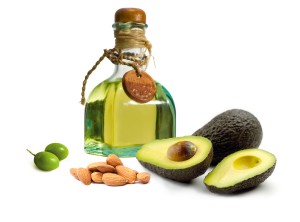As a general rule, look for oils that are organic, non-GMO, cold pressed or centrifuge extracted and unrefined. These qualifiers mean that the oil was not extracted from chemically treated or genetically modified crops, and was not processed at a high heat which can cause rancidity and oxidation. Refined oils are less nutrient dense than un-refined oils, but when cooking at higher heats refined oils are a better choice since they have a higher smoke point. Words like “virgin”, “extra-virgin” and “light” indicate an unrefined oil. Become familiar with the smoke points of your oils. When an oil is heated above its natural limit, it starts to break down and become oxidized. Oxidation causes free radical production which damages our cells and can even promote cancerous cell formation. Light can also promote oxidation so keep your oils in dark glass bottles and store in a cool, dark place.
Avocado oil– This is a super star oil! Packed with mono-unsaturated fats this oil is great for cooking at high temps with a smoke point of 520 degrees in its refined form. Unrefined or virgin avocado oil is best used in dressings and other cold preparations as it shouldn’t be heated past 320 degrees.
Flaxseed oil –Flaxseed oil is best used on salads as it has a low smoke point of 225 degrees. Flaxseeds are a good source of an Omega 3 called alpha-linolenic acid which is important for brain health, but it also contains a good amount of Omega 6s so proceed with caution.
Sesame oil – This oil should be used sparingly. If you use sesame oil often, make sure you are checking the boxes discussed above. Sesame oil has a high Omega 6: Omega 3 ratio which can promote inflammation
Sunflower oil – This oil should be used sparingly. If you use sunflower oil often, make sure you are checking the boxes discussed above. Sunflower oil has a high Omega 6: Omega 3 ratio which can promote inflammation
Coconut oil – Primarily a saturated fat and solid at room temp, coconut oil is an amazing source of caprylic acid which promotes ketone production, increases HDL cholesterol, promotes brain health and has powerful anti-microbial and anti-fungal properties. It also has a high smoke point making it ideal for frying, baking and sautéing. If you want to skip the coconut flavor, look for a coconut oil that is refined to have a neutral flavor.
Olive oil– An oil to use every day! Just be careful about heating virgin or extra virgin oil past 320 degrees. Refined olive oil is less nutrient dense but can be used for higher temp cooking up to 465 degrees. Olive oil is a great source of mono-unsaturated fat which helps calm inflammation, promotes fat burning and helps raise HDL cholesterol (the “good” kind).
Almond oil – Almond oil is another good source of mono-unsaturated fat. It has a low smoke point so it works best in cold preparations or dishes that aren’t heated past 320 degrees. Try using it in home made but butters or salad dressings
Again, as a general rule, avoid most “vegetable” oils unless you trust the source and they fit the criterion listed above. Vegetables oils have higher Omega 6 content to Omega 3 content (Ideal is 1:1) and promote inflammation. Oils to use caution or avoid using on a daily basis are soybean oil, peanut oil, sesame oil, corn oil, sunflower oil, grape seed oil and safflower oil.
Contributed by Elizabeth McKinney, MS, CNS, LDN, CLT



